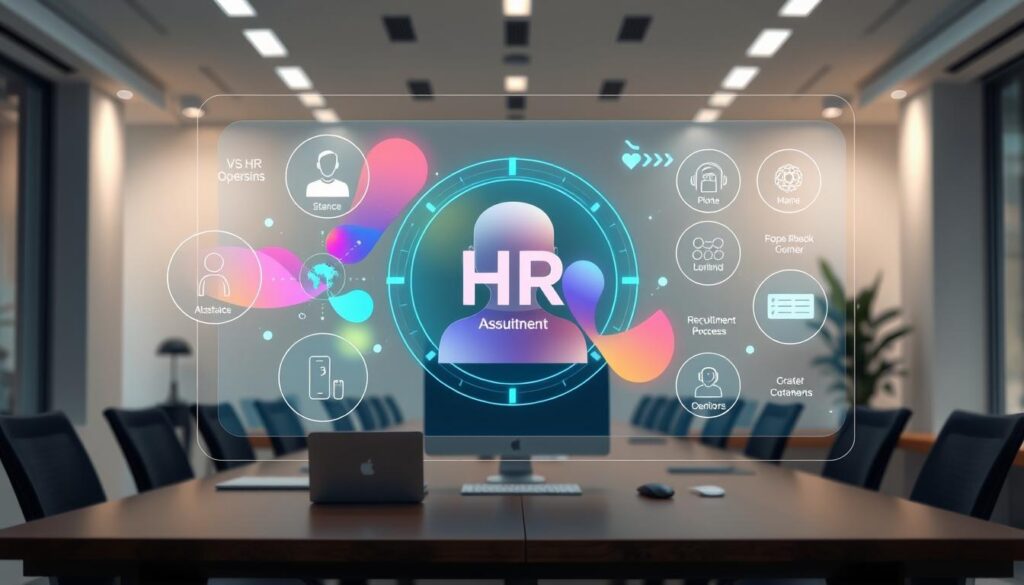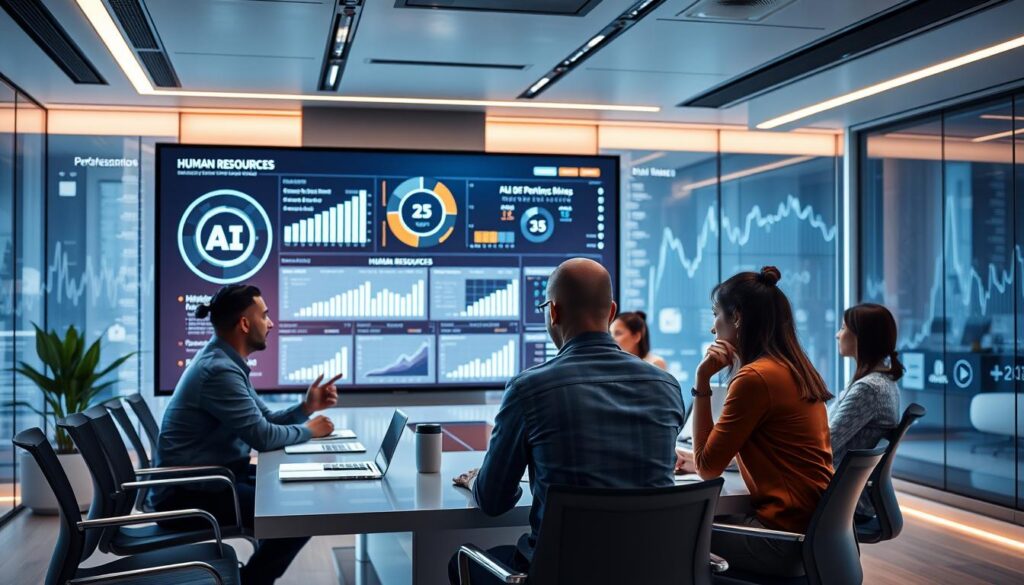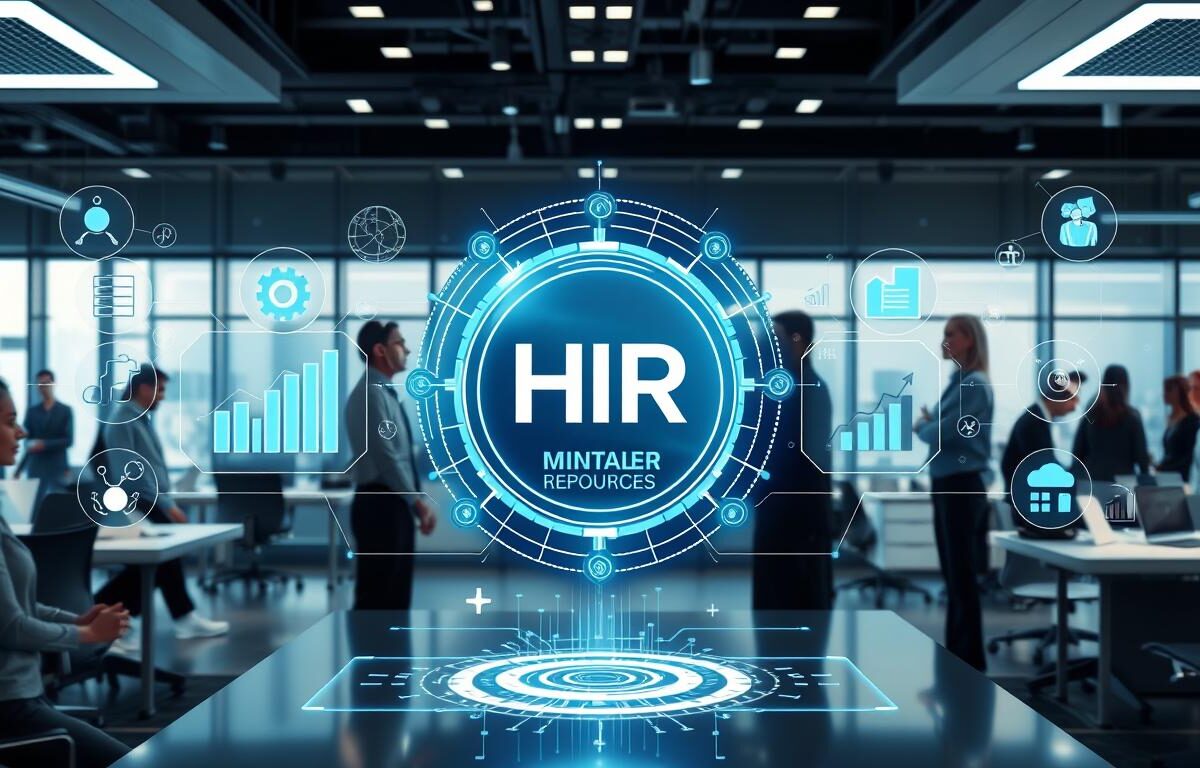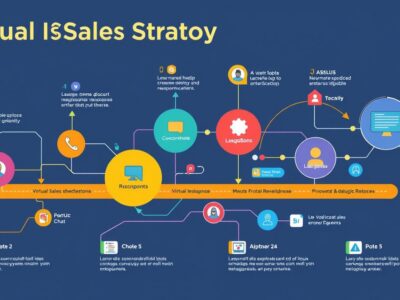The use of AI agent for human resources is changing the HR world. With AI HR technology, HR teams can now do routine tasks faster. This lets them focus on bigger projects. IBM is a front-runner in this area. It has AI agents that can handle complex HR tasks smoothly. They follow all the rules and improve how things run and how happy employees are.
AI-powered HR solutions are making big changes, especially in support, hiring, and welcoming new employees. IBM’s AskHR tool is a great example. It has solved 94% of employee questions. This shows how useful it is. And it saves a lot of money. Using AI like this is important for companies that want to stay ahead.
Key Takeaways
- AI agents boost HR work by doing tasks like answering employee questions. They get very high satisfaction scores.
- Using AI can save a company a lot of money. It can be more than USD 5 million a year and cut 50,000 hours of managerial work.
- Even though some people might not like changes, using AI smartly is key for the future of work and managing performance.
- It’s crucial for HR people to learn new skills. This helps them work well with AI tools.
- IBM’s AI agents use advanced technology. They work well with existing systems, helping with HR tasks.
Understanding AI Agents in Human Resources
The use of AI agents for human resources is changing HR departments for the better. These AI-powered HR solutions make operations smoother and improve how companies manage their staff. AI agents work on their own to do many HR jobs, requiring less work from people.
Using smart HR solutions, companies become more efficient. They also create a better and lasting working environment. This step into the digital age uses advanced tech that understands spoken language and does complicated tasks easily.
What is an AI Agent?
An AI agent in HR is like a virtual helper, understanding and acting on what users ask in natural language. It manages data and carries out HR tasks on its own. These agents use machine learning and language understanding tech to do their jobs well.
Key Characteristics of AI Agents
An AI agent can adapt its interface, do many tasks like analyzing data and improving workflows, and work well with current HR systems. They change their responses based on new data or changes in the HR world.
Benefits of Using AI in HR
Switching to AI-powered HR solutions helps businesses save money, make more money, and run more smoothly. A 2024 McKinsey report says companies using AI in HR saw big cost cuts and higher revenue from better productivity. Using AI changes how companies hire and keep employees happy, making sure decisions are based on data and can adapt as business needs change.
Overall, using AI agents for human resources is a big move. It turns HR into a key part of the company that’s fast, smart, and efficient. This is essential for keeping an edge in today’s ever-changing business scene.
Streamlining Recruitment Processes
AI is changing how we manage talent and hire people. It makes finding the right people faster and less work. By adding a virtual HR assistant, these tasks go from boring to strategic.
Automating Candidate Screening
AI agents use smart algorithms to sort through resumes quickly and find the best candidates. They make screening faster and match the job with the right people precisely.
Enhancing Interview Scheduling
Setting up interviews can be tough. A virtual HR assistant uses AI to handle schedules, send reminders, and matches interview times easily. This cuts down on endless emails.
Reducing Time-to-Hire
Using AI in hiring cuts down on the time it takes to hire someone. It handles the screening and scheduling, so hiring managers do more important things. They focus on making decisions and talking to candidates.

| Statistic | Data |
|---|---|
| Percentage of HR leaders who have adopted or are exploring AI tools | 38% |
| Percentage of organizations at risk of lagging behind if not adopting AI in HR | 76% |
| Percentage of HR managers who agree AI tools save costs | 93% |
| Predicted percentage of workforce requiring reskilling due to AI by | 40% |
AI is crucial for HR’s future. These stats show AI’s current use in HR and its positive effects. By using AI, companies improve efficiency and pave the way for new innovations.
Improving Employee Engagement and Retention
Businesses are moving fast into digital transformation. An artificial intelligence HR assistant plays a key role in boosting employee satisfaction and keeping them on board. Companies are now using AI, like HR chatbots, for instant, smart insights. This helps in making employee interactions smoother and their work life better.
AI integration in HR helps in faster, more efficient communication. It creates custom experiences for employees, raising their engagement. Thanks to AI, companies see a big boost in how much work gets done and how happy employees are.
Personalized Communication with AI
Using an artificial intelligence HR assistant allows for customized talks with employees. AI is great at understanding different employee needs and preferences. This helps HR send messages and resources that really speak to each person. From career advice to wellness plans, it makes sure everyone feels seen and valued.
AI-Powered Feedback and Surveys
Employee satisfaction gets a boost from AI-powered surveys and feedback tools. It lets companies keep up and make quick changes based on what employees say they need. This creates a place where everyone feels they can grow and sees a future for themselves.
AI tools like predictive analytics and sentiment analysis help businesses stay ahead of problems. They can keep employee turnover low. The AIHR Institute talks about how AI in HR makes things better. It shows the big pluses of using digital tech.
The move towards AI in companies is changing HR for the better. It’s making workplaces where people are happy to stay. AI is key in handling HR tasks well, keeping employees happy, and making sure they stick around.
AI in Performance Management
Incorporating AI HR technology into performance management systems is changing the way organizations manage staff. AI helps companies make smarter decisions by using data. This makes the process of evaluating employees more efficient and precise.

AI’s most notable role in performance management is its data-based reviews. It can look at tons of data quickly, giving managers useful tips to make employees better. This makes the review process more accurate, moving away from just trusting one’s gut.
Data-Driven Performance Reviews
Companies like Lattice now use AI for easier performance reviews. This tech saves managers from tons of paperwork, freeing them to talk more with their team. It also helps make sure reviews are fair because it’s based on data.
Continuous Feedback Mechanisms
Another plus of using AI in performance management is ongoing feedback. Unlike yearly reviews, AI gives feedback all the time. This helps employees get better continually, making the workplace more agile and effective.
Using AI technologies like Betterworks and Lattice, companies see productivity go up. They also enjoy a stronger feedback cycle. AI takes over routine tasks, letting managers focus on strategy and helping employees grow.
To wrap up, AI HR technology is really shifting how we manage performance. With smart tools for making decisions and giving feedback, companies can build a team that’s skilled, happy, and performs well.
Leveraging Analytics for Strategic Decisions
In our world full of data, predictive analytics in HR is key. HR departments use analytics to better hire, keep, and grow talent. They use HR virtual agents to make smarter, strategic choices. Let’s look at how predictive analytics and checking employee satisfaction change HR strategies.
Predictive Analytics in HR
Predictive analytics predicts the future using past data and machine learning. It’s vital for HR tasks like planning, managing talent, and enhancing performance. By looking at past patterns, HR virtual agents can foresee future needs. This helps HR to act before issues arise, not after.
- Data analytics changes HR’s role to a key strategic partner.
- Data modeling and tests are key for decisions on promotions and pay.
- It can also show which hiring methods work best, helping HR teams improve.
Measuring Employee Satisfaction
Analytics are also crucial in measuring employee satisfaction. They let HR see how well policies work on morale and engagement. This feedback is essential for a positive workplace and aligning goals with the company’s.
- AI surveys give real-time views on how happy and engaged employees are.
- AI can create stories showing how changes might make workers happier.
- For example, feedback can suggest tweaks in remote work policies for better satisfaction.
To wrap up, using HR virtual agents and analytics helps HR predict and prepare for challenges. It ensures strategies boost the organization’s success. By analyzing employee satisfaction data, HR makes a big impact on worker happiness and the company’s success.
Challenges of Implementing AI Agents
Adding AI to human resources brings many chances to make things better and faster. But, starting this change has big hurdles that need smart planning. It’s not just about making things easier but also dealing with the problems that come up.
Data Privacy Considerations
Using AI in HR means handling a lot of private info. Keeping this data safe is a big deal. Any mistake can cause legal problems and people might lose trust. Big companies like Google and Salesforce are putting a lot of money into keeping data safe. They protect it while making HR tasks better.
Resistance to Change in HR Culture
Bringing in AI tools to HR faces pushback. Some places really stick to the old ways. Moving to new, AI tools makes some people unsure. The key is for HR heads to really talk up the good things about AI. They need to show it doesn’t replace people but helps them do better. Starting slow and teaching everyone can help make this big change smoother.
| Company | AI Solution | Impact on HR Processes | Employee Perception |
|---|---|---|---|
| Microsoft | Copilot Studio | Enhances complex tasks like lead qualification | Positive, seen as a productivity tool |
| Hiring Assistant | Reduces hiring time by up to 75% | Varied, concerns about depersonalization | |
| ServiceNow | Integrative AI for IT and HR | Complements existing HR functions | Generally positive, with emphasis on AI as support |
| Workday | Various HR automation tools | Improves leadership coaching and onboarding | Mixed, with some resistance due to culture shift |
This table doesn’t just show what AI does but also how people feel about it. It shows the ups and downs of using AI in HR. This shows why putting AI into HR needs careful planning.
Future Trends in AI for Human Resources
The digital age is changing human resources, too. In the HR field, AI is becoming a game-changer. It is making everything more efficient and helping with decisions. Studies show 76% of HR experts see AI as key to success. They believe it will bring about more innovation and better results. HR folks will get tools for predicting job needs, aiding employee growth, and making starting jobs smoother.
Integrating AI with Existing HR Systems
For AI to work well in HR, it must fit into existing systems. Companies like Rippling have done this by adding over 600 AI connections, including Asana and Datadog. This lets HR pros stay ahead in planning and improve employee management with AI insights. AI aims to make teamwork better between people and tech, especially in planning and understanding emotions.
The Role of AI in Workforce Planning
AI is about to change workforce planning big time. Tools like Workable make hiring fair by judging candidates on the facts. Nailted AI speeds up reviews and feedback, saving time and improving results. AI is also guessing who might leave a job and helping keep staff longer. It even predicts performance, making it crucial for planning and decisions. With many companies planning to use more AI in HR by mid-2024, big changes are ahead. AI will not just help HR teams but change their roles entirely.
FAQ
What is an AI Agent for Human Resources?
An AI agent for HR is software that does HR tasks on its own. It understands natural language and helps automate tasks. This means less manual work for both employees and HR folks.
What are the key characteristics of AI agents in HR?
Key traits include understanding natural language, doing HR tasks with little human help, and working with various HR systems. They’re smart and manage tasks smoothly.
How does using AI in HR benefit organizations?
AI helps by doing repetitive tasks faster, making employees happier with personal chats, and helping hire better. It also helps make smarter business decisions with its data insights.
How does AI automate candidate screening?
AI manages job openings, narrows down applicants, and finds the best fits. This lets HR focus on promising candidates, making hiring smoother.
In what ways does AI enhance interview scheduling?
AI organizes interviews by working out good times, setting calendar alerts, and sending reminders. It makes the whole process more efficient and less of a headache.
How does AI help in reducing time-to-hire?
AI speeds up resume reviews, setting up interviews, and talking to candidates. It helps companies hire quicker by handling these steps fast and well.
How does AI enable personalized communication with employees?
Through chatbots and virtual helpers, AI gives fast, personal support to each worker. It also suggests training perfect for each person’s career goals.
What is the role of AI-powered feedback and surveys in HR?
AI-driven surveys and feedback give real insights into how happy and engaged workers are. It lets HR quickly see where to improve and act to make things better.
How are performance reviews data-driven with the help of AI?
AI reviews employees by looking at their work metrics and key indicators. It automates the review steps, offering deep analysis to help managers review fairly.
What are continuous feedback mechanisms in AI?
AI gives constant feedback, helping keep open talks between managers and workers. It encourages ongoing growth and adjusts advice based on the latest data and trends.
How can predictive analytics influence HR strategies?
Predictive analytics lets HR guess staffing needs and foresee possible issues before they happen. It uses data models to guide upfront and smart decision-making.
Why is measuring employee satisfaction important and how can AI help?
Knowing how happy workers are is key to keeping a great team. AI looks at surveys and data to show how staff feels, helping HR make the workplace better.
What are the data privacy considerations when implementing AI in HR?
It’s critical that AI respects data laws, keeps worker info safe, and keeps HR data private. This builds trust and keeps privacy in check.
How does resistance to change in HR culture affect AI implementation?
Pushback against new tech can slow AI adoption. But explaining AI’s perks and offering good training can help HR teams embrace it.
How will AI integrate with existing HR systems in the future?
AI will blend more with HR systems, fitting businesses’ needs. It’ll connect systems, automate more, and offer deep insights to fine-tune HR tasks.
What role will AI play in workforce planning?
AI will offer better data for hiring, planning promotions, and development. It’ll predict staffing needs and skill gaps, helping align the workforce with business aims.



